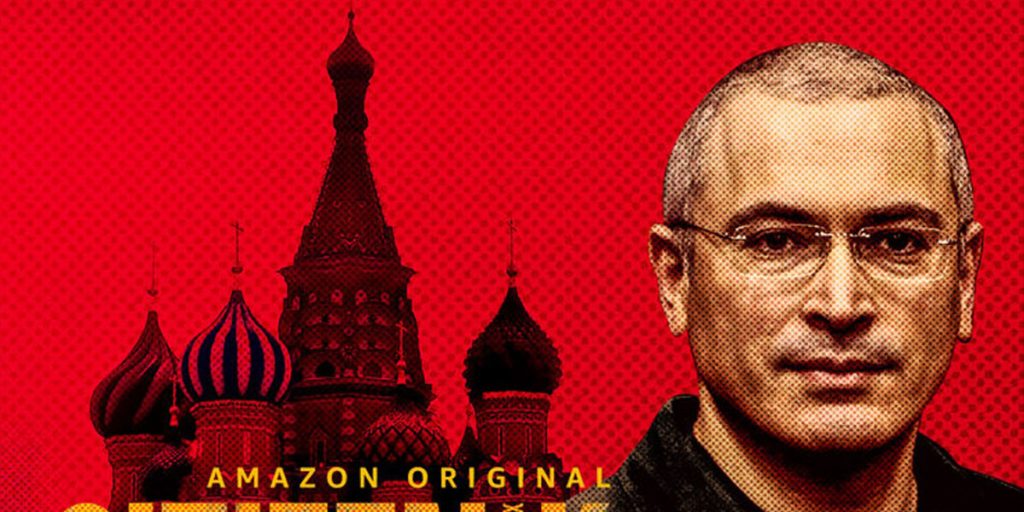Citizen K takes viewers into an in-depth exploration of Russian oligarchy and power dynamics. And that might be its fatal flaw as well.
Alex Gibney’s latest documentary is all about oil and fire and how they managed to get powerful Russian oligarch Mikhail Khodorkovsky into trouble. Mr. Khodorkovsky here is quite a character, and a famous enough one – you might have been distractedly zapping through his face a couple of decades ago. Born of a poor proletarian family in Communist Russia, after the fall of the Berlin Wall, Mikhail decided he wanted to be rich. First, he managed to be introduced to former Russian President Yeltsin’s acolytes; then, he ranked among the top oligarchs of the country, that is, a powerful political lobby made up of public companies’ tycoons.
But as Western-led deregulation set in, plunging poor and underdeveloped Russia into the pit of desperation, Khodorkovsky felt that something was wrong in the system, and decided not to comply with the Communist Party’s requests anymore. He went public with Yukos, his oil company, and stroke deals with Western oil providers. That upset Putin, who had, by that time, made his way to the top of the post-Soviet power hierarchy. Khodorkovsky was put in prison and sentenced to 13 years of reclusion. Pardoned by Putin himself during the opening ceremony of the Sochi Olympics, he’s now an exile in the UK, from where he continues his struggle for truth and open markets in contemporary Russia.
This is all very sad and very true, and Gibney stresses the historical accuracy of his account interspersing his own footage and interviews with TV programmes from the ‘90s – when everything happened – onwards and other bits and pieces of blissful vintage reels. At the same time, though, Citizen K accompanies its epic of rampant State-stirred gangster capitalism with an aura of je-ne-sais-quoi poetry coming from the emotionally-tuned score that underlines every image.

So, as Gibney’s fast-paced, cubist montage drags us along the different times and places where this story of Faustian bargains and rising oligarchs took place, we cannot but feel that everything’s running way too smoothly here. Instead of being forced to recognise a more complex world as a result of us watching this documentary, we close our laptops finding ourselves in our hopefully warm and comfy living rooms all over again, reassured that there are bad people ruling Russia today – something we’ve been always convinced of – and good people in the West – obviously; that’s where we live – who are playing all their best cards to crush this reactionary 20th-Century Empire of Evil.
If this sounds like Star Wars to you, that’s why it does, a little. It takes more than a bit of an effort to dissociate ourselves from the perfectly running, seamless narration of Citizen K; more than a drop of good will to detect the whispered accusations against the all-but-naive role Western powers played in the dissolution of the Soviet Union and everything that happened afterwards. Though Citizen K is not a naive documentary, it comes across as so in the moment when Gibney swamps his harder truths with genre stylistics and good-will audience paternalism.
Hearing Khodorkovsky’s story is fundamental to understand Russian-Western relationships today, and it’s comforting that someone finally had the courage to put more inconvenient truths on film. Nonetheless, Gibney’s Citizen K’s the fatal flow lies in its being maybe too much of a “good” documentary. Its sticking to genre forms and conventions leaves nothing behind but a strong feeling of unintended void. Which kind of takes my mind back to the first time I (did not) listen to John Cage’s 4’33”: despairing silence, and the strong feeling you’re not at all sure of what that was supposed to mean. Maybe that I’m just stubbornly refraining from relating this film’s content to Welles’s Citizen Kane – by the way, yes I am. What I know is that Citizen K was an enjoyable movie, but it was literally too good to be true. And that, if you asked me what I learnt from that, it was that, yes: Vladimir Putin really is kind of short.
Citizen K is now available to watch on digital and on demand.

